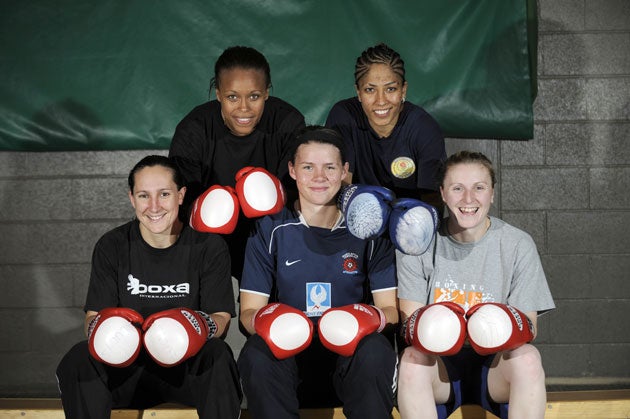Olympic rings beckoning for the ladies who punch
Girl power is back as the fastest-growing sport in Britain heads for London 201

They are coming up to the final round in the fight to get women's boxing into the Olympic Games for 2012 and when the scorecards are collected in Berlin this week it looks certain that the judges from the International Olympic Committee willdeclare girl power the winner.
While it may be a split decision – male chauvinism has not totally been KO-ed – the influence of "referee" Jacques Rogge is likely to clinch it. "The timing is right," says the IOC president, himself a former boxing doctor. "The sport has evolved a lot." It will also complete Rogge's Olympic jigsaw of equality, boxing being the sole single-sex sport left in the Games.
All of which is good news for London 2012, and Britain's boxing belles, who recently returned from the European Union Championships in Bulgaria with a fistful of medals.
Fisticuffs and the fair sex have gone hand in boxing glove for almost two decades now, but it is only recently that Britain has produced several hits among the Misses. There are now around 650 ladies who punch compared to less than 50 five years ago and the Euro medal-winning quintet of Savannah Marshall, Natasha Jonas and Sharon Holford (all gold), Hannah Behanny and Lucy O'Connor (both bronze), plus Nicola Adams, a current world silver medallist, are proof that, whatever some of the sport's traditionalists, such as Amir Khan – "they should stick to tennis" – may think, Britain has become a real fighting force in women's boxing.
The blockbuster movie Million Dollar Baby raised the profile of the sport, but its tragic ending – the would-be champion, played by Hilary Swank, dies on a life-support machine – also raised questions about whether boxing really is the sort of thing you would want your daughter or girlfriend to get up to. Britain's female fighters remain unfazed. "To be honest, I got hurt more when I was playing football," says Jonas, 25, from Liverpool. "We do too much ducking and diving to really get damaged."
There is also a misconception that women boxers are all butch and biceps, or as intimidating out of the ring as Jane Couch, aka the Fleetwood Assassin, who once flattened a bloke in a Blackpool bar who pinched her bum.
Mick Gannon, the England national coach, says: "These girls are boxers but they are also ladies – a little bit girlie in some ways. They can be boisterous at times but then most girls are. I'm really chuffed they've done so well. Women's boxing is now the biggest growth sport in the country."
Technically, claims the former Army Physical Training Instructor, the women are very sound. "They don't have the men's animal aggression or explosive power – not that you would expect them or want them to," says Gannon. "I look upon women's boxing as a form of dance routine with skill and my job is to put a bit of snap into it."
In the Olympics they will box four two-minute rounds. The IOC are looking at a maximum of five weights – it may only be three – and the likelihood is that one of the men's weights will be dropped so as not to increase the overall number of boxing participants.
Most girls come into boxing from other contact sports or "boxercise". In the England squad, there is a laboratory assistant and a former lifeguard. All have to make contributions to their training expenses but a recent ABA camp in Portsmouth was subsidised by the Royal Navy, in which O'Connor, 29, serves as a lieutenant and her husband is a boxing coach.
She is an intelligent, lucid student of the sport. "I took it up to keep fit but for me it is now a way of life. I live it and breathe it. The thing I always get is, 'Oh, you don't look like a boxer'. I think the traditional stigma that has been attached to women's boxing has now gone. People are starting to appreciate that it's a thinking woman's sport. It's not a barbaric duel, more like chess in the ring." She has won 26 of her 32 bouts, including Euro bronze this year and gold in 2008.
Potentially the big hit of 2012 is the unbeaten Savannah Marshall, 18, from Hartlepool, who has stopped almost half of her 18 opponents. Tall and painfully shy, she clearly articulates in the ring and took up boxing "because there's nowt else to do where I come from". The other girls call her The Silent Assassin.
Their icons range from Manny Pacquiao to Laila Ali and Katy Taylor, Ireland's 60kg world champion who is described by Gannon as "a lovely kid but a real handful when the bell goes. She's something special".
Jonas speaks for them all when she says: "The Olympics would be a dream come true but it is as much for the sport and the kids coming through. It will give women's boxing the extra punch it needs."
British Olympic Association
The British Olympic Association (BOA), formed in 1905, are the national Olympic committee for Great Britain and Northern Ireland. They prepare and lead the nation's finest athletes at the summer, winter and youth Olympic Games, and deliver elite-level support services to Britain's Olympic athletes and their national governing bodies. For further information, go to: olympics.org.uk
Subscribe to Independent Premium to bookmark this article
Want to bookmark your favourite articles and stories to read or reference later? Start your Independent Premium subscription today.

Join our commenting forum
Join thought-provoking conversations, follow other Independent readers and see their replies